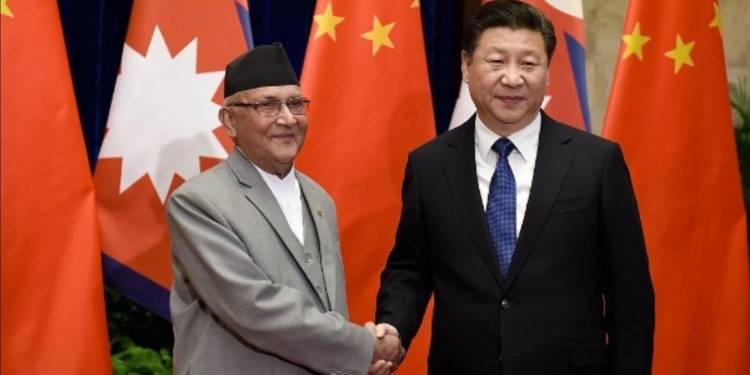The ruling Nepal Communist Party has been making some nasty remarks against India, and it is being led in this anti-Indianism by Nepal’s Prime Minister KP Oli Sharma himself. On Wednesday, he made certain baffling comments in Nepal’s Parliament.
In what can be termed an utter shocking statement, the Nepalese Prime Minister said that people who are entering Nepal illegally through India were responsible for spreading the Wuhan coronavirus in the country and said that “Indian virus looks more lethal than Chinese and Italian now”.
According to reports, Oli said, “Those who are coming from India through illegal channels are spreading the virus in the country and some local representatives and party leaders are responsible for bringing in people from India without proper testing. It has become very difficult to contain Covid-19 due to the flow of people from outside. Indian virus looks more lethal than Chinese and Italian now. More are getting infected.”
Oli also strongly supported the distorted political map that Nepal released earlier this week. The political map is provocative- it shows India’s Lipulekh, Kalapani and Limpiyadhura, under Nepalese territory. Strongly backing his cabinet’s move to release the new political map, KP Sharma Oli has said, “We won’t let this issue fade out and it will be sorted out through diplomatic talks making concrete efforts and the territories will be reclaimed.”
He also said, “We are least bothered if anyone gets angry and will reclaim the land at any cost.” Nepal clearly doesn’t care about its strong cultural ties and friendship with India any longer, and Nepal’s Prime Minister is himself needling India.
First Nepal alters the map claiming disputed territory as its own.
Then PM Oli says “we are least bothered if anyone gets angry & will reclaim the land at any cost.”Now Nepal is blaming India for the Wuhan virus spread!What explains this brinksmanship in the middle of a pandemic? https://t.co/nCQm9BNq8Y— Palki Sharma (@palkisu) May 20, 2020
At the centre of Kathmandu’s fresh hostility towards India is a strategic road link that connects Dharchula and Lipulekh in the Pithoragarh district of India’s Uttarakhand state. The road link that gives India a vantage point at an altitude of 17,060 feet above sea level, and only 4 kilometres away from the LAC with China was inaugurated earlier this month.
The road has been constructed on India’s territory, and did not emerge out of thin air. India had started construction on the road link in the year 2008, but for 12 years Nepal did not object. Now, that India has gained a strategic advantage, the Communist regime claims that it is Nepalese territory.
The timing of the move itself makes it that much more objectionable. Not very long ago, the Nepal Communist Party was headed for an imminent split, which would have meant curtains for the KP Sharma Oli government. But the Chinese Ambassador to Nepal held a series of meetings with top Nepal Communist Party leaders, and meddling openly into Kathmandu’s political affairs, China saved the day for the KP Sharma Oli government.
India inaugurated the Dharchula-Lipulekh road link days after Chinese President Xi Jinping put all his weight behind KP Sharma Oli. For decades, Nepal hasn’t been vocal about the issue, nor has it released political maps showing the so-called disputed areas in its territory. But this time around things are different, Beijing is dictating political terms in Nepal and this is why KP Sharma Oli is ratcheting irredentism against India.
Nepal’s Prime Minister is looking to prove his allegiance to Beijing, whose support has helped him avert an imminent downfall. In the process, he is reducing Nepal into China’s client state in utter disregard of India’s security interests and historically close bilateral ties. He doesn’t understand what a strategic blunder he is committing which his successors will regret for many years to come.
Nepal’s PM says, “India has deployed its troops in Kalapani since 1962 and our rulers in the past hesitated to raise the issue.” It is plainly insensitive that he should bring up the 1962 war and India’s military positing in the area.
If this is his explanation for raking up minor border disputes that date back to the 1816 Sauguli treaty, then it means that Nepal might well align with China the next time there is a Sino-India conflict. India has not reacted sharply thus far, apart from disapproving Nepal’s new political map. But if India gives up on Nepal, the consequences will be dire for Nepal, and not India.
Prime Minister Oli’s latest comments can also be attributed to the fact that Nepalese government does not want to anger its Chinese masters. The situation of Coronavirus in the country is getting worse day by day with increase in number of cases. According to reports, the country has reported 17 new COVID_19 cases taking the total number of cases to 444. This will automatically lead to a resentment among the Nepalese citizens against the Chinese Communist Party. So, in order to shift the blame away from China, Nepal’s PM came up with this illogical statement against India.
It is not in the interest of Nepal to become China’s client state, especially because nearly 6 million Nepalese citizens live and work in India, bringing huge remittances for the Himalayan country. But KP Sharma Oli and Foreign Minister Pradeep Gyawali’s highly distasteful remarks might disillusion India and force New Delhi to shut the open borders with the landlocked country, if it starts acting more and more like a Chinese mouthpiece.
By hobnobbing with China, and jeopardising India’s security interests, Nepal is putting itself in an awkward position. India has kept its Nepal border open despite the international boundary being a hub of illegal activities. Now, if Kathmandu inadvertently manages to destroy bilateral ties beyond repair, it will mean that India shuts doors on Nepal.
Nepal, being a landlocked country is entirely dependent on the Kolkata port for trade activities. The Oli government wants to build a special relationship with China, at the cost of cultural ties with India- a strategic blunder that will have major repercussions for Kathmandu.
























